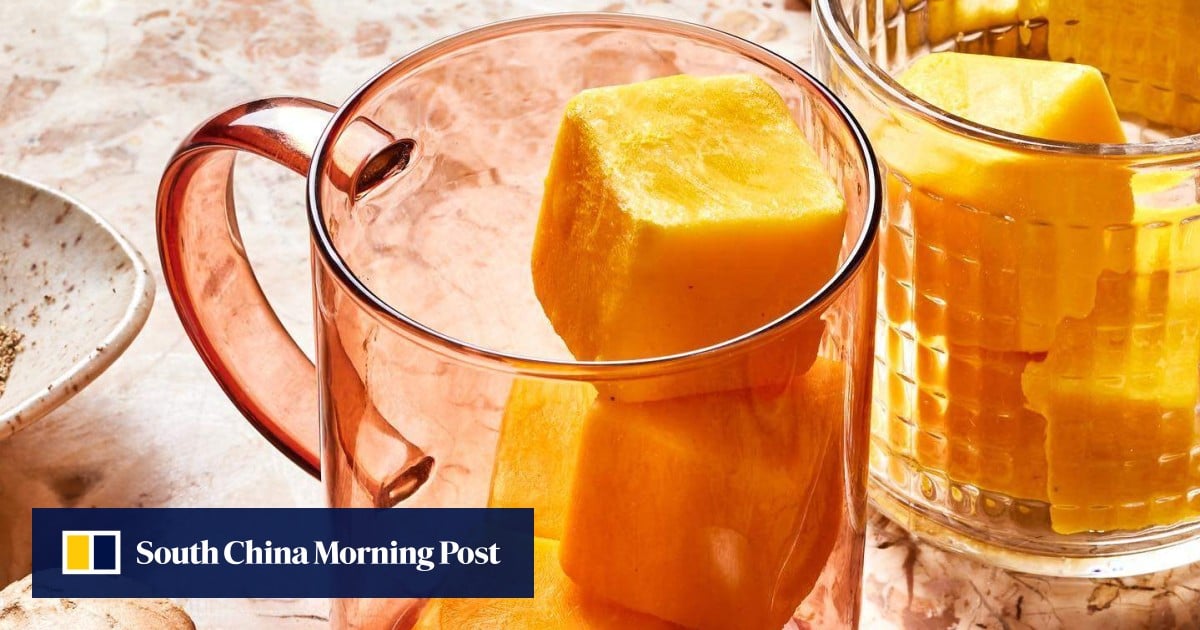“They are sweet, they are tart, they are creamy, and they are full of ingredients to help keep your immune system in tip-top shape,” Modic says on her blog.
------Advertisement-----
“Not only are they delicious and nutritious, they are so simple and easy to mix.” She also refers to them as “the ultimate recipe for a lazy girl”.
To make Modic’s cubes, simply blend together the following ingredients and freeze them in an ice cube tray:
------Advertisement-----
-
half a lemon, chopped (antioxidants)
-
1 carrot, chopped (vitamin A and beta carotene)
-
1 tsp ground turmeric (anti-inflammatory)
-
1 tsp black pepper (allows the body to absorb the turmeric’s nutrients)
-
2 to 3 pieces raw ginger (antioxidant, digestive aid)
-
a third of a cup of honey (sweetness to balance taste)
-
1 orange, chopped (vitamin C)
-
half a cup (optional) (adds creaminess, but high in fat; also has vitamin C, iron and other nutrients)
-
3 cups water or coconut water (coconut water adds flavour and vitamin C)

Modic suggests three ways to enjoy them:
-
Pour warm water over three to four cubes and drink.
-
Let a few cubes come to room temperature and drink them as a shot.
-
Pop a few into a smoothie with a liquid of your choice.

Popular food blogger Hajar Larbah, who uses the handle Moribyan (for Moroccan and Libyan, her parents’ heritage) and counts more than 4.9 million TikTok followers and 2 million Instagram followers, posted a video of her own recipe for them.
------Advertisement-----
“Immunity cubes! I also love buying mini bottles and turning them into immunity shots. Five-minute recipe,” her caption reads.
The blogger, who graduated from the US-based University of California, Berkeley, with a degree in nutrition and dietetics, likes to add one of the cubes to a cup of tea.
India-based nutritionist and author Kavita Devgan says that immunity cubes are a great health hack, as all the ingredients typically used in making them are good for supporting immune system health.
She lists their health-giving properties:
-
ginger can help reduce pain and inflammation;
-
turmeric has been used in the traditional Indian medicine known as Ayurveda for centuries as an anti-inflammatory;
-
honey can boost gut health and soothe sore throats;
-
oranges and lemons have vitamin C and folates which are important in building immunity;
-
black pepper boosts white blood cells; and
-
coconut milk has the beneficial fat lauric acid which helps fight bacterial, fungal, and viral infections.
She warns, however, against having too much of any one ingredient – taking too much vitamin C, for example, can cause nausea, vomiting, diarrhoea and other symptoms.
The cubes can function only as an add-on, Devgan says, noting they are not a cure-all.

It is believed the nutritional and medicinal value of food, including its vital energy, or prana, evaporates when we store it in the fridge or freezer for a few days.
She suggests that having a fresh version, such as the suggested “immunity shots”, is preferable to the frozen cubes.
Dietitian Avni Kaul, also in India, says immunity cubes are a convenient way to boost immune function but, while they contain important nutrients, she also advises against relying too heavily on them.
“This may lead to a false sense of security, potentially discouraging individuals from adopting other healthy habits,” Kaul says.
Srishti Krishnan, an advertising professional, says that she – like many of her friends – makes her own immunity cubes during India’s monsoon season, when colds and flus are common.

One of the best things about immunity cubes is how versatile and handy they are, says Seema Patel, a homemaker in Bengaluru, who makes them to pop into tea or hot water.
